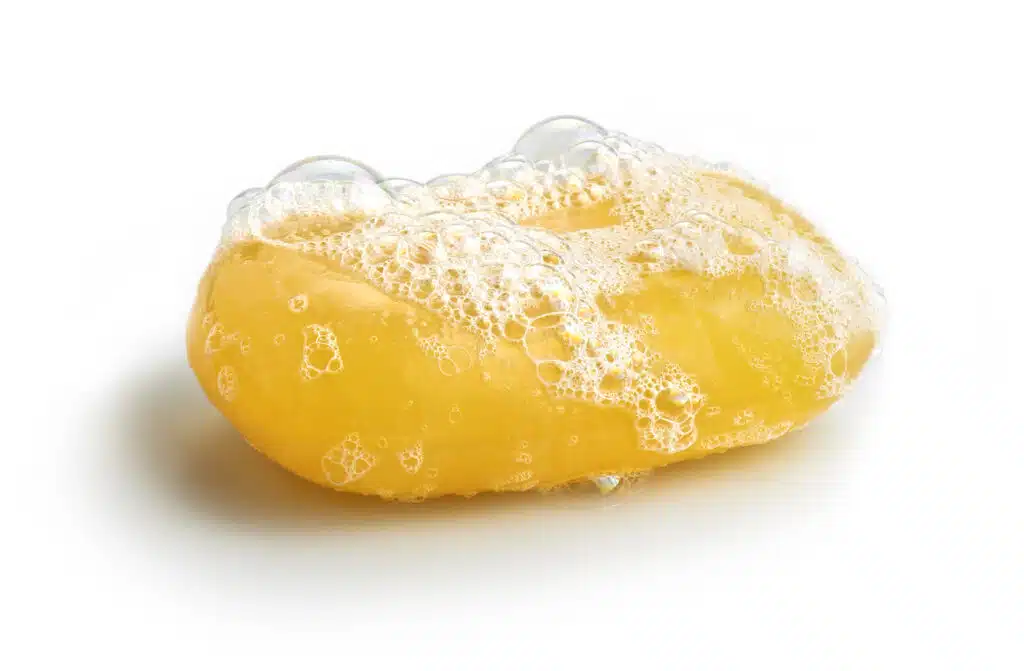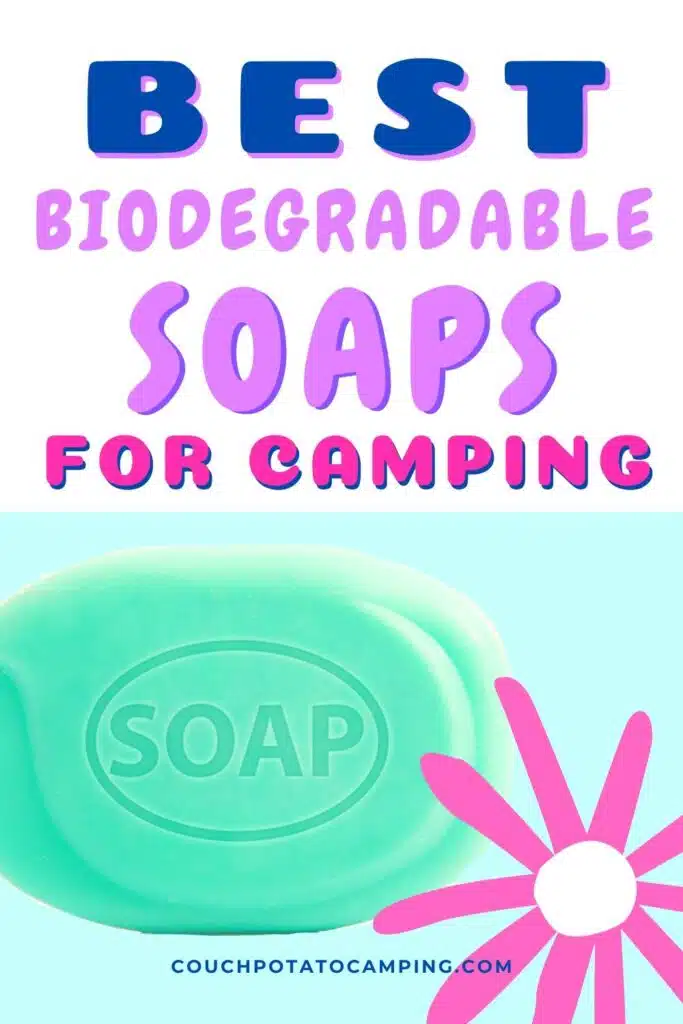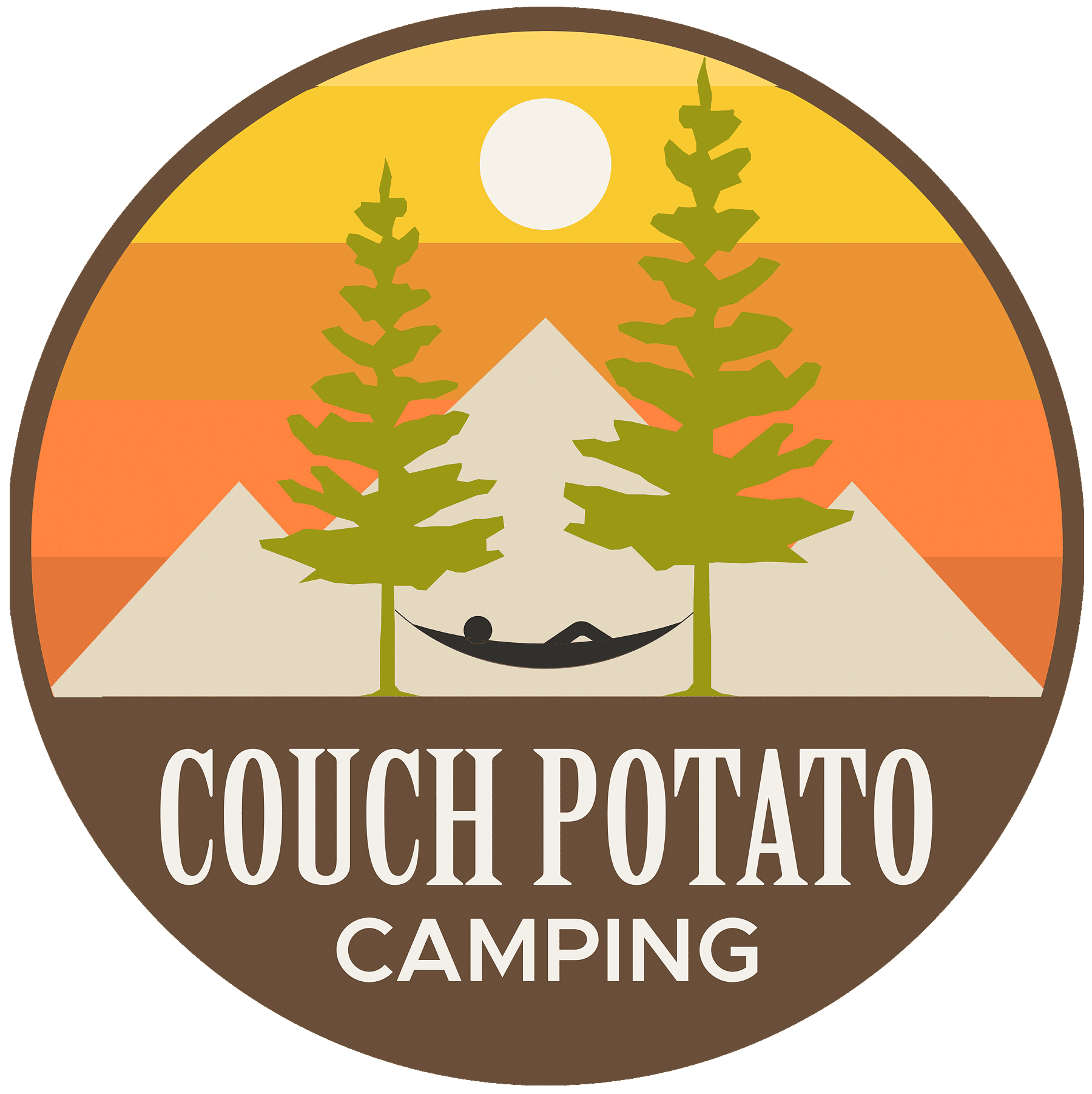If you make a purchase using links in this article, I could receive a commission. Please see my Privacy Policy for information.
Did you know that not all soaps are created equal? Sure, they all clean well. But some are pretty harmful to nature. Before you head out on your camp or RVing trip, get a bottle of one of these best biodegradable soaps for camping.

What is Biodegradable Soap?
All soap will clean. But not all soap is made with the same ingredients.
Biodegradable soap is different because its ingredients can be broken down into relatively harmless materials for the environment, such as water, carbon dioxide and other organic materials.
Often, biodegradable soap is made with vegetable oils, such as coconut oil.
The soap doesn’t just turn into water and harmless materials as soon as you dump it, though. Instead, it needs bacteria and time to break down the ingredients of the soap.
Biodegradable soap is free of harmful chemicals, including surfactants, triclosan and other anti-bacterial chemicals, and also contains no phosphates.
What are phosphates?
Among the many things harming waterways in the environment are too many phosphates being washed into rivers, streams, lakes and the ocean.
Phosphates are commonly used in soaps and detergents. The chemicals are what makes soap strip off grease, sweat and grime from dishes and clothing.
As phosphates are washed into waterways from water treatment facilities, storm drains and run off from fields using phosphorous-based fertilizers, they start to choke away life in rivers and streams. Phosphates cause too much vegetation to start growing (such as algae blooms) and they reduce the amount of oxygen in the water, which in turn affects wildlife.
Why Does It Matter If I Use Biodegradable Soap?
Chances are, while camping, the soap you use will be washed away outdoors. This can happen in a variety of ways, such as:
- Washing your hands
- Rinsing off pet’s paws
- Washing dishes
- Showering
- Cleaning dirt off an RV or camper
- Washing windows on your car, van, truck or RV
- Rinsing the RV awning
When car camping, tent camping, or van living, you are more likely to dumping soap on the ground because you don’t have grey tanks (or large enough grey tanks) to hold the used soapy water for storing.
If you are traveling in an RV or trailer with a grey tank, soap that you use will likely be dumped when you dump your tanks.
However, if you are boondocking in your RV and are trying to conserve your tank capacity, you might be tempted to dump your grey tanks in the woods. Which might be fine in certain areas, but only is you use a nature-friendly, biodegradable soap.
What Brands of Soap are Biodegradable?
These are the best biodegradable soaps to use outdoors.
Dr. Bronner’s
This biodegradable soap is quite honestly the holy grail of camping soaps. And it’s our top pick.
Known for being an ethical and environmentally conscious company long before anyone else, everything Dr. Bronner’s makes is from pure ingredients that aren’t harmful. The liquid Castile soap has a multitude of uses, from hand washing and shaving to brushing your teeth or washing your towels.
You can buy it unscented, or choose from Peppermint, Lavender and other scents.
What we love is that it is sold in small travel-size bottles, larger bottles and as bar soap. It’s perfect for easily adding to your camping supplies.
Hint: If you are only camping for a short while, cut off a slice of the bar soap to bring with you rather than bringing the entire bar.
Sea to Summit
This company creates a few different products, including Wilderness Wash which is a liquid soap, and Pocket Hand Wash, which are dry soap sheets. Soap sheets are like dried pieces of soap. When you add water, such as putting a small soap sheet in your wet hands, the sheet becomes like soap.
Sea to Summit Wilderness Wash is a concentrated soap that works on everything, so you can use it for washing your body or washing your dishes.
Campsuds
Made with citronella, lavender and peppermint oils, this concentrated liquid soap also doubles as an insect repellant. Which all campers can rejoice about!
Again, it comes in a small bottle and is super concentrated. So you don’t need to carry around a lot of it. Which is great if you are backpacking.
Kirk’s
This bar soap has been sold since 1839, so it’s formulation has been perfected! The Castile soap is super gentle, unscented and biodegradable. Ingredients include natural oils such as coconut oil and essential oils.
What About Dawn Dish Soap?
Have you seen the cute commercials with baby ducks covered in oil being washed with Dawn dishwashing liquid to save them? You probably think that because the soap is being used on wildlife, then Dawn dishwashing liquid must be biodegradable and eco-friendly.
Dawn Free & Clear Dishwashing Liquid states that it uses biodegradable cleaning ingredients. It does not state that the soap is biodegradable. Understand the difference?
Using biodegradable ingredients (such as water) in addition to other ingredients does not inherently make the entire soap biodegradable.
A quick look at the ingredients used in Dawn Free & Clear Dishwashing Liquid (we didn’t even look at the common blue stuff, because that color isn’t natural) will show a whole list of chemicals such as sodium lauryl sulfate, sodium laureth sulfate, fragrance and methylisothiazolinone (which the EPA and EWG state is toxic to aquatic life).
And traditional Dawn dishwashing liquid is made of petroleum – about 1/7th of the product is derived from petroleum, according to an NPR report.
There are a lot of other soaps to choose from on this list that are effective for cleaning while camping.
Safest Way to Use Biodegradable Soap
Just because the soaps you are using are biodegradable, doesn’t mean there is no danger in dumping them in nature.
Using biodegradable soap means you are doing a seriously great thing for the environment. There’s just one or two steps to take to make sure you are a good steward of your campsite and Leave No Trace.
Biodegradable soap can’t be washed away into a river, stream or lake. So you wouldn’t want to wash your dishes in the side of a stream and rinse them with the creek water. (You wouldn’t want to do this for many reasons, including bacteria and organisms that could be in the water and deposit on your dishes.)
Instead, you want to make sure that wherever you are washing your hands or pet’s paws, taking a shower or washing dishes is at least 200 feet away from a water source.
Ideally, to be a good steward of the land, you’ll want to pour your soapy water into a shallow hole (about 6-8 inches deep at least) and then cover back with dirt.
Why?
Because biodegradable soap ingredients need bacteria to break them down to become harmless. Washing the soap directly into a waterway doesn’t provide the bacteria to break down the soap. By putting it directly in the ground, where there are tons of beneficial bacteria, the soap ingredients can be broken down into smaller components that are not harmful.
Save this list for later! Pin It to a camping board on Pinterest.

More Eco-Friendly Washing Tips
Using biodegradable soap is a smart solution to being eco-friendly when camping.
But there are some other great ways, too.
- Use soap sparingly. Even biodegradable soap has its problems. Use as little as you can.
- Consider using only water if possible. Hot water is surprisingly effective at washing.
- Bring disposable baby wipes or body wipes to keep clean. These can be stored in a bag or container and disposed of properly at home or in a trash can.
